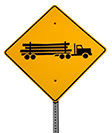
One of the most important decisions timberland owners face when selling timber is the choice of a qualified logger to conduct the cutting operations. Each time the stand is entered, from the first thinning all the way through to final harvest, stand quality and the long-term environmental and aesthetic qualities of the overall property can be affected, either for good or bad.

All timberland owners have heard horror stories about devious loggers “scamming” unsuspecting landowners. Some stories are about loggers paying well under market value for the timber. Others are about loggers who have no respect for the landowner’s property and either high grade the timber or fail to implement best management and other sustainable management practices.
While these stories are sometimes true, it is fortunately not the norm. Most loggers are reputable and conduct their businesses with respect and integrity. They usually have many years’ experience and understand/implement good forestry practices. Timberland owners should still complete their due diligence by researching qualified loggers or hire a professional forester to assist in overseeing the harvest.
Here are a few tips for landowners thinking of selling timber:
- Get references from forestry professionals and timberland owners. A logging business earns a reputation for good/bad work performance. Professional foresters work with logging businesses on a regular basis and can give valuable insight into the quality of work a company does. Likewise, other landowners will gladly give recommendations about which companies do a good job. Also, if possible, visit one of the logging company’s recent job sites. This will give you a firsthand perspective on the quality of work a logger does before you make the hiring decision.
- Ask about qualifications: While most states in the South do not mandate qualifications for loggers, most do offer continuing education classes and master logger certification programs where loggers learn the most up-to-date best management practices (BMPs), safety training and business practices. Choosing a certified or trained logger is highly recommended.
- Require insurance. Ask for verification of insurance. If a logger is uninsured, a landowner can be held liable for any incident that occurs during the logging operation on your property.
- Sign a contract. Create a contract outlining every detail of the harvest. This should include (but is not limited to) which trees to cut/leave, the level of clean up required after the harvest, the standards for road maintenance, the method of payment and the term length of cutting rights. Be specific about your expectations.
The majority of logging companies are reputable, and timberland owners should not be wary of dealing directly with a logger when it comes time to harvest timber. However, as with any other business transaction, use common sense. Research each company you are considering for hire and—if necessary—consult a professional forester to assist you with marketing your timber and managing the harvest.


 Joe Clark
Joe Clark



